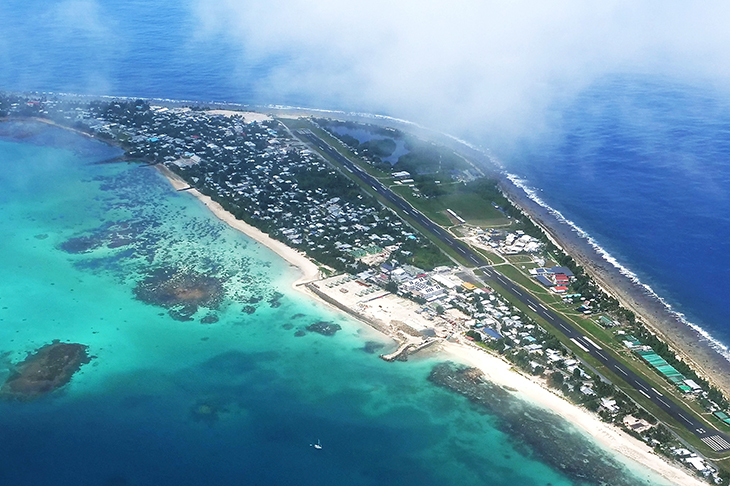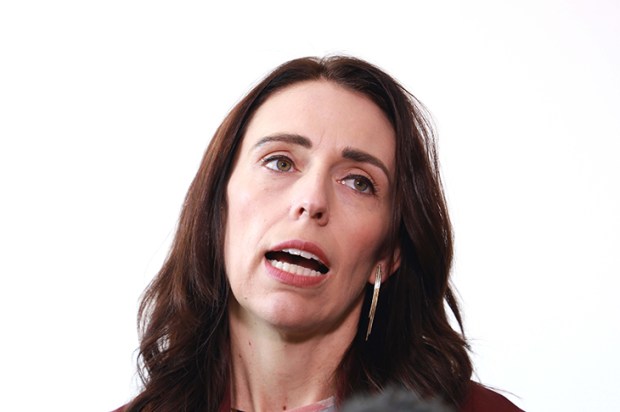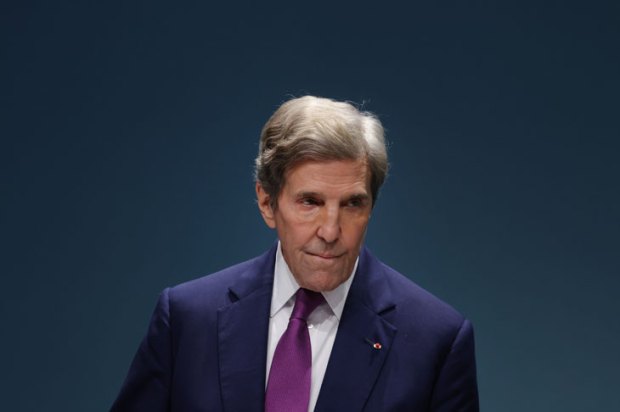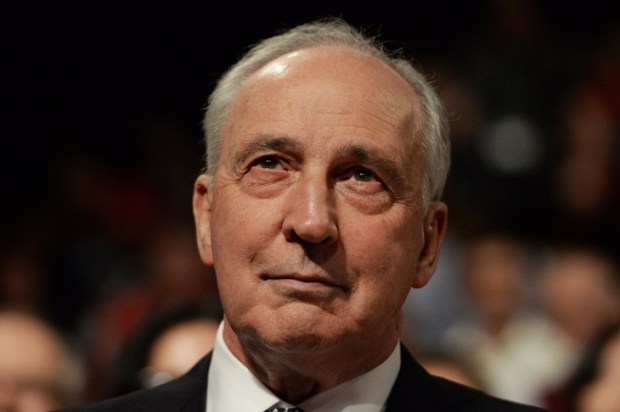A Pacific Island Forum in Tuvalu was always going to be inundated by climate catastrophism. One of the lowest-lying island groups in the world, Tuvalu may not be sinking beneath the ocean, but it is drowning in tears.
UN Secretary-General Antonio Guterres gave a foretaste of the lamentations in May when he tweeted after visiting Tuvalu, ‘Nowhere have I seen the heartbreaking impacts of climate change more starkly than in this island nation.’
Leaders arriving at the summit were greeted by children lying submerged in water, little South Pacific Ophelias, wreathed in flowers as they sank to a watery demise in a moat built around the model of an island, while crooning: ‘Save Tuvalu, save the world.’ Tonga’s PM Akilisi Pohiva, ‘a heartrending figure’ according to the Guardian, wept just thinking about a presentation by two young women fearful for the future.
Not to be upstaged — after all it was his party and he’d cry if he wanted — the Prime Minister of Tuvalu Enele Sopoaga got emotional telling Prime Minister Morrison, ‘You are trying to save your economy, I am trying to save my people.’
Sopoaga used a dawn demonstration of Tuvaluan fishing techniques to show the Guardian what the leaders were trying to do. The fishers walk into the lagoon in a line, slapping around palm branches under the water to frighten the fish, which are herded toward the reef, trapped and scooped up with nets. It was a good metaphor; obviously the fish that the leaders were trying to land was Morrison, who announced $500 million for climate resilience and adaptation for the Pacific region. But Sopoaga wasn’t going to be bought off that cheaply: ‘No matter how much money you put on the table, it doesn’t give you the excuse not to do the right thing… cut down on your emissions, including not opening your coalmines.’
The moral fervour is not new. At the Copenhagen Climate Change Conference in 2009, Tuvalu’s representative Ian Fry took a biblical tone, befitting a region where muscular Christianity — think Israel Folau — is still a force to be reckoned with: ‘It looks like we are being offered 30 pieces of silver to betray our people and our future… Our future is not for sale.’.
Unfortunately, Tuvalu’s future is for sale, and not for a piddling 30 pieces of silver. The asking price, set out in Tuvalu’s declaration of Small Island States, is to acknowledge that there is a climate change ‘crisis’, ‘re-affirm the UN Secretary-General’s call for an immediate global ban on the construction of new coal-fired power plants and coal mines,’ ‘rapidly phase out’ the use of coal in the power sector, endorse a UN commitment to a carbon-neutral economy by 2050 and shell out more funding for the UN’s Green Climate Fund.
Even New Zealand’s Jacinda Ardern, the Millennial Mother Teresa of the cult of climate alarmism blushed at that last point. The Green Climate Fund has a goal of raising $100 billion per year by 2020 from public and private sources and Tuvalu was expecting Australia not just to kiss goodbye to our most valuable export, coal, which generated some $67 billion in the most recent financial year, but to commit to providing millions more in finance for the UN slush fund to finance green climate boondoggles.
Australia has already disbursed $US 187m ($US 8 per capita), while New Zealand has disbursed a mere $US 2.6m ($US 56c per capita) but that didn’t stop Mother Jacinda sermonising, saying ‘Australia has to answer to the Pacific,’ and ‘if we all took the perspective that if you’re small it doesn’t matter, we wouldn’t see change. Every single little bit matters.’
In NZ’s case its emissions reductions aren’t small, they are non-existent and for Ardern to preach to Australia on the subject takes chutzpah. On the most recent data available (2017), Australia’s net emissions are down 12 per cent since 1990 while NZ’s are up a whopping 65 per cent over the same period. That’s despite our faster economic and population growth, and New Zealand’s natural energy advantage thanks to its hydro endowments.
But in the Looking-Glass Land of climate catastrophism, rhetorical flourishes are all that count. Ardern made a big deal at the Pacific Island jamboree of her ‘zero carbon bill’ but it commits to a zero target of all greenhouse gases by 2050, except for biogenic methane, the big one for New Zealand since about 50 per cent of its emissions come from agriculture. In other words, New Zealand livestock will continue to fart in our general direction.
Thanks to researchers at CSIRO and the University of the Sunshine Coast developing pink seaweed to stop cows burping methane, that may matter even less than it does now but the chance of getting any thanks from climate catastrophists is the only ‘zero emission’ that is guaranteed. As Greenpeace said, doing its best to fulfil its prophecy, it is Australia that could become ‘the pariah of the Pacific.’ Right on cue, Fijian Prime Minister Frank Bainimarama, who, after waging a war on democracy in his country, was a president of the UN’s leading climate body, the Conference of the Parties and has reinvented himself as a ‘global leader in the fight against climate change,’ said Morrison had been ‘very insulting and condescending’ and ‘after what we went through with Morrison, nothing,’ meaning China, ‘can be worse than him.’
Anote Tong, the former president of Kiribati, took up the refrain telling the ABC that China is really ‘the lesser of two evils.’ Perhaps Mr Tong needs to ask the people of Hong Kong, Tibet or Xinjiang, or practitioners of Falun Gong for their perspective. Perhaps he hasn’t noticed that while millions of people apply to seek asylum in Australia, nobody, not even the North Koreans, seeks asylum in China.
Mr Tong says Australia should be suspended from the Pacific Islands Forum for its climate inaction. The ABC seemingly didn’t ask Mr Tong his views on China’s climate ‘action.’ It is only the world’s largest emitter, whose emissions are projected to rise until 2030, and has not only started construction of 28 GW of new coal-fired power capacity in 2018 within China but is also financing and building one quarter of all coal plants under development outside of China. But in the South Pacific, leaders can’t see beyond Australia. Sopoaga says ‘we cannot go on talking about partnerships… while you keep pouring your coal emissions into the atmosphere that is killing my people and drowning my people into the water.’ It matters not that research from the University of Auckland shows that island expansion has been the most common physical alteration throughout Tuvalu over the past four decades. Sopoaga, the lachrymose King Canute of climate catastrophism insists that ‘Tuvalu (is) not expanding,’ the tides will advance and is weeping all the way to the bank
Got something to add? Join the discussion and comment below.
Get 10 issues for just $10
Subscribe to The Spectator Australia today for the next 10 magazine issues, plus full online access, for just $10.
You might disagree with half of it, but you’ll enjoy reading all of it. Try your first month for free, then just $2 a week for the remainder of your first year.














Comments
Don't miss out
Join the conversation with other Spectator Australia readers. Subscribe to leave a comment.
SUBSCRIBEAlready a subscriber? Log in